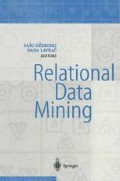Abstract
Inductive logic programming (ILP) is concerned with the development of techniques and tools for relational data mining. Besides the ability to deal with data stored in multiple tables, ILP systems are usually able to take into account generally valid background (domain) knowledge in the form of a logic program. They also use the powerful language of logic programs for describing discovered patterns. This chapter introduces the basics of logic programming and relates logic programming terminology to database terminology. It then defines the task of relational rule induction, the basic data mining task addressed by ILP systems, and presents some basic techniques for solving this task. It concludes with an overview of other relational data mining tasks addressed by ILP systems.
Access this chapter
Tax calculation will be finalised at checkout
Purchases are for personal use only
Preview
Unable to display preview. Download preview PDF.
References
F. Bergadano and D. Gunetti. Inductive Logic Programming: From Machine Learning to Software Engineering. MIT Press, Cambridge, MA, 1995.
H. Blockeel and L. De Raedt. Top-down induction of first order logical decision trees. Artificial Intelligence, 101: 285–297, 1998.
I. Bratko. Prolog Programming for Artificial Intelligence, 3rd edition. Addison-Wesley, Harlow, England, 2001.
L. Breiman, J. H. Friedman, R. A. Olshen, and C. J. Stone. Classification and Regression Trees. Wadsworth, Belmont, 1984.
W. Buntine. Generalized subsumption and its applications to induction and redundancy. Artificial Intelligence, 36(2): 149–176, 1988.
P. Clark and R. Boswell. Rule induction with CN2: Some recent improvements. In Proceedings of the Fifth European Working Session on Learning, pages 151–163. Springer, Berlin, 1991.
P. Clark and T. Niblett. The CN2 induction algorithm. Machine Learning, 3(4): 261–283, 1989.
L. De Raedt. Attribute-value learning versus inductive logic programming: the missing links (extended abstract). In Proceedings of the Eighth International Conference on Inductive Logic Programming, pages 1–8. Springer, Berlin, 1998.
L. De Raedt, editor. Advances in Inductive Logic Programming. IOS Press, Amsterdam, 1996.
L. De Raedt and L. Dehaspe. Clausal discovery. Machine Learning 26: 99–146, 1997.
L. De Raedt and S. Dzeroski. First order jfc-clausal theories are PAC-learnable. Artificial Intelligence, 70: 375–392, 1994.
S. Dzeroski, S. Muggleton, and S. Russell. PAC-learnability of determinate logic programs. In Proceedings of the Fifth ACM Workshop on Computational Learning Theory, pages 128–135. ACM Press, New York, 1992.
W. Emde and D. Wettschereck. Relational instance-based learning. In Proceedings of the Thirteenth International Conference on Machine Learning, pages 122–130. Morgan Kaufmann, San Mateo, CA, 1996.
P. Flach. Logical approaches to machine learning — an overview. THINK, 1(2): 25–36, 1992.
C. Hogger. Essentials of Logic Pogramming. Clarendon Press, Oxford, 1990.
A. Karalic and I. Bratko. First order regression. Machine Learning 26: 147–176, 1997.
S. Kramer. Structural regression trees. In Proceedings of the Thirteenth National Conference on Artificial Intelligence, pages 812–819. MIT Press, Cambridge, MA, 1996.
R.D. King, A. Karwath, A. Clare, and L. Dehaspe. Genome scale prediction of protein functional class from sequence using data mining. In Proceedings of the Sixth International Conference on Knowledge Discovery and Data Mining, pages 384–389. ACM Press, New York, 2000.
N. Lavrac, S. Džeroski, and M. Grobelnik. Learning nonrecursive definitions of relations with LINUS. In Proceedings of the Fifth European Working Session on Learning, pages 265–281. Springer, Berlin, 1991.
N. Lavrac and S. Dzeroski. Inductive Logic Programming: Techniques and Applications. Ellis Horwood, Chichester, 1994. Freely available at http ://www-ai.ijs.si/SasoDzeroski/ILPBook/.
J. Lloyd. Foundations of Logic Programming, 2nd edition. Springer, Berlin, 1987.
R. Michalski, I. Mozetic, J. Hong, and N. Lavrac. The multi-purpose incremental learning system AQ15 and its testing application on three medical domains. In Proceedings of the Fifth National Conference on Artificial Intelligence, pages 1041–1045. Morgan Kaufmann, San Mateo, CA, 1986.
Muggleton, S., editor. (1991) Proceedings of the International Workshop on Inductive Logic Programming. University of Porto, Portugal.
S.H. Muggleton, editor. Inductive Logic Programming. Academic Press, London, 1992.
S. Muggleton. Inductive logic programming. New Generation Computing, 8(4): 295–318, 1991.
S. Muggleton. Inverse entailment and Progol. New Generation Computing, 13: 245–286, 1995.
S. Muggleton and W. Buntine. Machine invention of first-order predicates by inverting resolution. In Proceedings of the Fifth International Conference on Machine Learning, pages 339–352. Morgan Kaufmann, San Mateo, CA, 1988.
S. Muggleton and C. Feng. Efficient induction of logic programs. In Proceedings of the First Conference on Algorithmic Learning Theory, pages 368–381. Ohmsha, Tokyo, 1990.
T. Niblett. A study of generalisation in logic programs. In Proceedings of the Third European Working Session on Learning, pages 131–138. Pitman, London, 1988.
S.-H. Nienhuys-Cheng and R. de Wolf. Foundations of Inductive Logic Programming. Springer, Berlin, 1997.
G. Plotkin. A note on inductive generalization. In B. Meltzer and D. Michie, editors, Machine Intelligence 5, pages 153–163. Edinburgh University Press, Edinburgh, 1969.
J. R. Quinlan. Learning logical definitions from relations. Machine Learning, 5(3): 239–266, 1990.
J. R. Quinlan. C4–5: Programs for Machine Learning. Morgan Kaufmann, San Mateo, CA, 1993.
J. Robinson. A machine-oriented logic based on the resolution principle. Journal of the ACM, 12(1): 23–41, 1965.
E. Shapiro. Algorithmic Program Debugging. MIT Press, Cambridge, MA, 1983.
A. Srinivasan. The Aleph Manual. Technical Report, Computing Laboratory, Oxford University, 2000. Available at http ://web.comlab.ox.ac.uk/oucl/research/areas/machlearn/Aleph/
J. Ullman. Principles of Database and Knowledge Base Systems, volume 1. Computer Science Press, Rockville, MA, 1988.
Author information
Authors and Affiliations
Editor information
Editors and Affiliations
Rights and permissions
Copyright information
© 2001 Springer-Verlag Berlin Heidelberg
About this chapter
Cite this chapter
Džeroski, S., Lavrač, N. (2001). An Introduction to Inductive Logic Programming. In: Džeroski, S., Lavrač, N. (eds) Relational Data Mining. Springer, Berlin, Heidelberg. https://doi.org/10.1007/978-3-662-04599-2_3
Download citation
DOI: https://doi.org/10.1007/978-3-662-04599-2_3
Publisher Name: Springer, Berlin, Heidelberg
Print ISBN: 978-3-642-07604-6
Online ISBN: 978-3-662-04599-2
eBook Packages: Springer Book Archive

